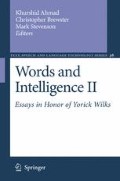This paper compares Yorick Wilks’s theory of preference semantics with the evidence of English usage in a large corpus and reports the rationale of a project (in progress) that attaches meanings, not to lexical items, but to contextual patterns, in which each lexical item is normally found. These contexts are based on analysis of a large corpus and stored in a Pattern Dictionary. In addition to other influences, this work is partly inspired by Wilks’s theory of semantic preferences of the 1970s, but there are significant differences. If meanings are attached to words in context instead of in isolation, the formulas needed to express them can express delicate distinctions without being excessively cumbersome. The Pattern Dictionary provides a resource for reducing lexical ambiguity in texts while maintaining interpretative delicacy. The meaning of a word in an unseen document can be estimated by matching its context to one or other of the normal contexts in the Pattern Dictionary, which are themselves explicitly linked to a meaning, called a primary implicature. In the past dozen years corpus analysis has shown with increasing clarity that, although the number of all possible syntagmatic combinations in which each word can participate is vast, and indeed perhaps unlimited, the number of normal syntagmatic combinations is manageably small. Examples are given of verb entries from the Pattern Dictionary
Access this chapter
Tax calculation will be finalised at checkout
Purchases are for personal use only
Preview
Unable to display preview. Download preview PDF.
References
Baker, C.F., and J. Ruppenhofer. 2002. ‘FrameNet’s Frames vs. Levin’s Verb Classes’ in J. Larson and M. Paster (eds.), Proceedings of the 28th Annual Meeting of the Berkeley Linguistics Society, pp. 27–38.
Church, K., and P. Hanks. 1990. ‘Word association norms, mutual information, and lexicography’ in Computational Linguistics 16(1).
Hanks, P., and J. Pustejovsky. 2005. “A Pattern Dictionary for Natural Language Processing” in Revue française de linguistique appliquée 10(2).
Katz, J.J., and J.A. Fodor. 1963. ‘The Structure of a Semantic Theory’ in Language 39.
Kilgarriff, A., D. Tugwell, P. Rychly, and P. Smrz. 2004. ‘The Sketch Engine’ in Proceedings of Euralex, Lorient, France, July 2004, pp. 105–116.
Kingsbury, P., and M. Palmer. 2002. ‘From Treebank to Propbank’, LREC-02: Third International Conference on Language Resources and Evaluation. Las Palmas.
Krovetz, R. 1998. ‘More than One Sense per Discourse’. NEC Princeton NJ Labs. Research Memorandum.
Lenat, D., and R.V. Guha. 1990. Building Large Knowledge-Based Systems: representation and inference in the Cyc project. New York: Addison-Wesley.
Levin, B. 1993. English Verb Classes and Alternations. University of Chicago Press.
Procter, P., et al. 1978. Longman Dictionary of Contemporary English, 1st edn. Harlow: Longman.
Pustejovsky, J. 1995. The Generative Lexicon. Cambridge, MA: MIT Press.
Pustejovsky, J., and P. Hanks. 2001. ‘Very Large Lexical Lexical Databases’. ACL Workshop, Toulouse.
Pustejovsky, J., P. Hanks, and A. Rumshisky. 2004. “Automated Induction of Sense in Context”. COLING 2004. Geneva, Switzerland.
Rumshisky, A., C. Havasi, and J. Pustejovsky. 2006. ‘Constructing a Corpus-based Ontology using Model Bias’. 19th International FLAIRS Conference.
Wilks, Y. 1972. Grammar, Meaning, and the Machine Analysis of Language. London: Routledge.
Wilks, Y. 1973. ‘Understanding without Proofs’. IJCAI, pp. 270–277.
Wilks, Y. 1975a. ‘Preference Semantics’ in E.L. Keenan (ed.), Formal Semantics of Natural Language. Cambridge: Cambridge University Press.
Wilks, Y. 1975b. “A Preferential, Pattern Seeking Semantics for Natural Language Inference” in Artificial Intelligence 6.
Wilks, Y. 1977. ‘Good and Bad Arguments about Semantic Primitives’ in Communication and Cognition 10(3/4).
Wilks, Y. 1978. ‘Making Preferences More Active’ in Artificial Intelligence 11(3); reprinted in N.V. Findler (ed., 1979), Associative Networks. New York: Academic Press.
Wilks, Y. 1980. ‘Frames, Semantics, and Novelty’ in D. Metzing (ed.), Frame Conceptions and Text Understanding. Berlin, New York: De Gruyter.
Wilks, Y., B. Slator, and L. Guthrie. 1996. Electric Words: Dictionaries, Computers, and Meanings. Cambridge, MA: MIT Press.
Wilks, Y., and R. Catizone. 2002. ‘Lexical Tuning’ in Proceedings of the 3rd International Conference on Computational Linguistics and Intelligent Text Processing (cicling 2002) Mexico City, Mexico. Lecture Notes in Computer Science 2276. Springer.
Wilks, Y., and N. Ide. 2006. ‘Making Sense about Sense’. Chapter 3 of E. Agirre and P. Edmonds (eds.), Word Sense Disambiguation: Algorithms and Applications, Berlin: Springer Verlag.
Yarowsky, D., W. Gale, and K. Church. 1992. ‘One Sense Per Discourse’ in Proceedings of the 4th DARPA Speech and Natural Language Workshop.
Author information
Authors and Affiliations
Editor information
Editors and Affiliations
Rights and permissions
Copyright information
© 2007 Springer
About this chapter
Cite this chapter
Hanks, P. (2007). Preference Syntagmatics. In: Ahmad, K., Brewster, C., Stevenson, M. (eds) Words and Intelligence II. Text, Speech and Language Technology, vol 36. Springer, Dordrecht. https://doi.org/10.1007/1-4020-5833-0_6
Download citation
DOI: https://doi.org/10.1007/1-4020-5833-0_6
Publisher Name: Springer, Dordrecht
Print ISBN: 978-1-4020-5832-5
Online ISBN: 978-1-4020-5833-2
eBook Packages: Humanities, Social Sciences and LawSocial Sciences (R0)

